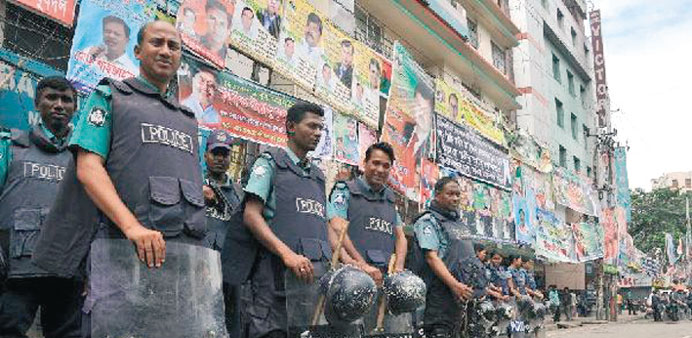Police stand guard in front of central office of Bangladesh Nationalist Party (BNP) during a countrywide strike in Dhaka yesterday.
A one-day strike in Bangladesh over arrest warrant issued against the main opposition party’s deputy chief yesterday threw normal life out of gear across the country.
Former prime minister Khaleda Zia’s Bangladesh Nationalist Party (BNP) on Monday called for the countrywide general strike, protesting the issuance of arrest warrant against its deputy chief and Zia’s son Tarique Rahman, now living in London.
A court in Dhaka on Sunday issued the warrant of arrest in a money laundering case, saying it would ask Interpol to help detain Rahman, the eldest son of two-times former premier Khaleda, also chairperson of BNP.
Rahman was arrested on March 7, 2007 on charges of corruption during the 2007-2008 military-controlled caretaker government. He went to London after his release on bail in September 2008 for “treatment” reportedly on condition of not participating in any politicalactivities during his stay there.
The court order triggered huge protests from the opposition party in the past three days when stray incidents of clashes, explosions of cocktails, torching and vandalism of vehicles were reported in parts of the capital city Dhaka and elsewhere in the country where the Prime Minister Sheikh Hasina’s government last week banned political rallies for one month.
Demanding withdrawal of the arrest warrant issued against Rahman, BNP had also enforced general strike in many Bangladesh districts on Monday and Tuesday.
BNP has termed the case against Rahman false and politically motivated and demanded immediate withdrawal of the warrant for his arrest.
BNP spokesman Shamsuzzaman Dudu yesterday urged the government to pave the way for his return to home and also demanded unconditional release of many detained opposition party high-ups and activists.
He called Rahman a “spiritual son of democracy”.
“By filing false cases against him the government is trying to tarnish his image as they are afraid of his huge popularity,” said Dudu yesterday.
Like the previous strike days, police were seen cordoning off the BNP headquarters in Dhaka’s downtown Naya Paltan area which wore a deserted look.
The dawn-to-dusk strike crippled normal life and business transaction to some extent with many main markets and educational institutions closed.
On account of the strike, the traffic movements on the city streets remained thin as most private vehicles were kept
indoors.
Additional law enforcers have been deployed in capital Dhaka to avoid any untoward incident during the strike.
Security forces dispersed protesters as they tried to hold marches along major roads in Dhaka and many other parts of the country.
Dhaka’s leading English newspaper The Daily Star reported torching and vandalism of 60 vehicles in the early hours of agitation in four Bangladesh districts.
Local TV reports said dozens of homemade bomb went off during the acts of violence though there were no immediate reports of injuries.
Picketers reportedly fought pitched battles with police in Narayanganj on the outskirts of capital Dhaka and they set fire on roads and exploded home-made bombs protesting the issuance of arrest warrant.
The arrest warrant was issued less than a week after Rahman was back in news as he attended a BNP function on May 20 in East London, where he stressed the need for a non-party caretaker system to oversee next national election slated for early 2014.
Hasina’s Awami League (AL) party, which has two-thirds majority in parliament, annulled the caretaker government system after Supreme Court on May 2011 repealed the 13th amendment to the country’s constitution through which the caretaker system was institutionalised in 1996 by the then BNP government under pressure from the then main opposition AL, now the ruling party.
Demanding restoration of the caretaker system, unconditional release of its leaders and protesting the ban on rallies for one month, Khaleda’s main 18-party opposition alliance Sunday enforced a countrywide general strike.
The main opposition party says it won’t allow any election in the country under any partisan government.

